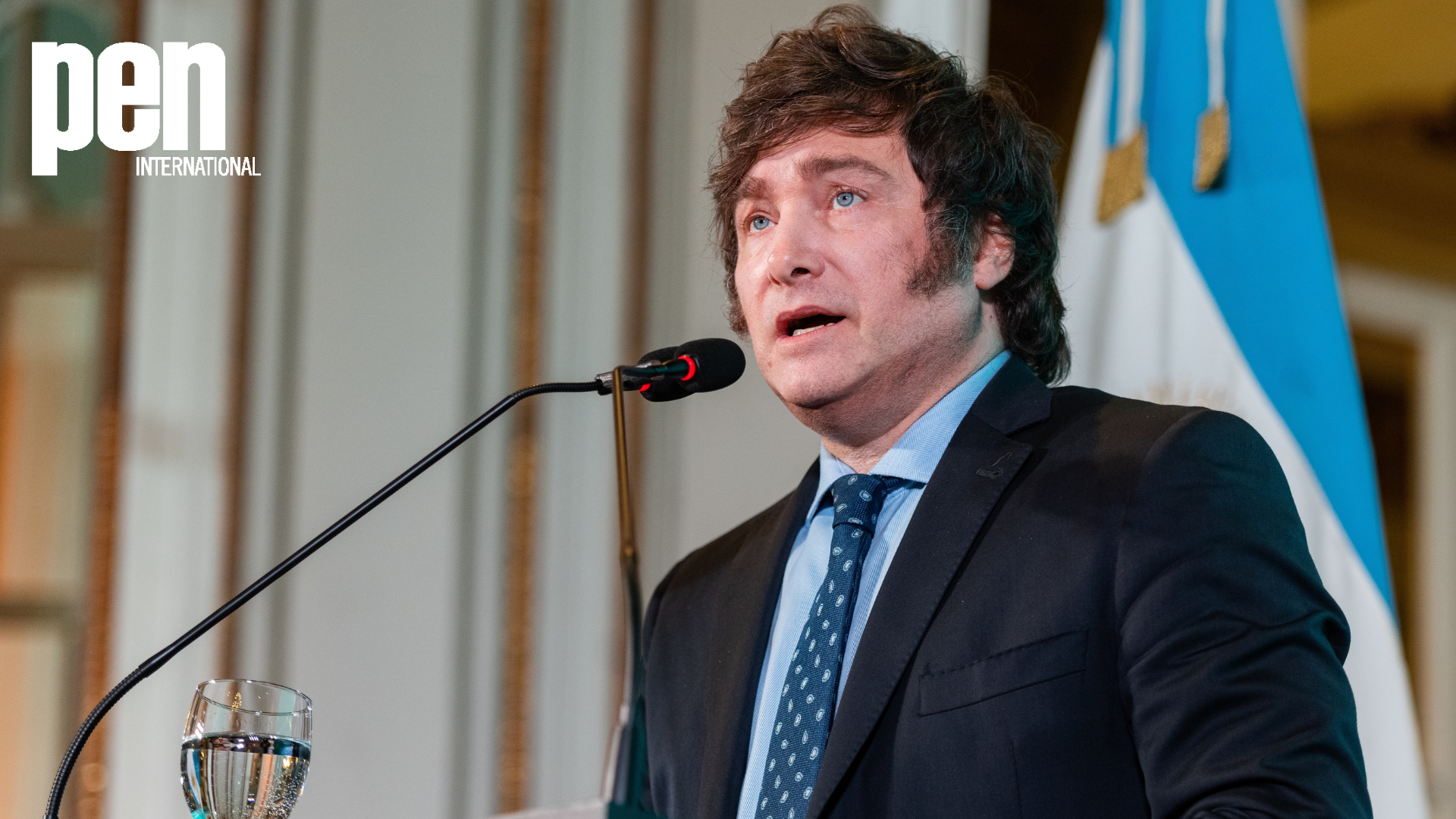Argentina: Serious deterioration of freedom of expression under Javier Milei’s government
Image Credit: Matias Lynch/ Shutterstock
Argentina’s president and his government must immediately end their campaign against press freedom and foster an environment in which writers and journalists can carry out their vital work without obstruction. — Burhan Sonmez, President of PEN International
Javier Milei has institutionalised abuse and delegitimization as the norm in his dealings with independent media. It is essential to guarantee an environment in which journalists, particularly those who express critical views, can work without fear or institutional censorship. — Gabriel Seisdedos, President of PEN Argentina
1 July 2025 — PEN International expresses deep concern over the worsening climate of hostility, censorship, and intimidation of journalists, writers and media outlets in Argentina, driven primarily by President Javier Milei and members of his government. In the first half of 2025 — 18 months into Milei’s presidency — PEN International documented a systematic pattern of verbal attacks, restrictive institutional measures, online harassment, and acts of violence, which represent a serious setback for freedom of expression in the country.
From repeated public insults and discrediting of the work of reporters, columnists, authors, and researchers, to restrictions on access to public information, President Milei’s statements and actions — both in the media and on social networks — fuel a climate of stigmatisation that jeopardises the free exercise of journalism, as well as the rights to information and freedom of expression.
Among the most alarming patterns recorded during the past months are:
Institutional silencing: Since 1 March 2025, mechanisms such as the so-called “mute button” in press conferences and restrictive accreditation filters have been implemented to prevent critical journalists from asking questions.
Restrictive legislation: At the end of 2024, the Access to Public Information Law was modified through Decree 780/2024. This amendment limits the scope of accessible information and extends the time during which documents may be kept classified. It also grants broader discretionary powers to public officials and alters the role of access officers.
Hate speech and stigmatising language: Javier Milei has intensified his verbal attacks on journalists, using derogatory terms such as “trash”, “imbeciles”, “bribed” (or “bought off”), and “the worst scum”. He has also stated that “people don’t hate journalists enough.” The Inter-American Commission on Human Rights reported a “rapid deterioration in the environment for the exercise of freedom of expression,” characterised by “the Executive’s low tolerance of criticism and deliberative processes,” manifested in “stigmatising speech, particularly from senior State authorities, directed at journalists and media outlets — and especially at women.”
Attacks against those challenging official narratives: Journalist Roberto Navarro was physically assaulted in April 2025 by unknown assailants who echoed President Milei’s exact words against the journalist. The incident occurred after Milei publicly posted hostile messages against Navarro — a stark example of how verbal aggression in public channels can result in real-world violence. The assailant was arrested.
Spread of defamatory AI-generated content: In early May 2025, Javier Milei circulated an AI-generated song on social media that mocked and vilified critical journalism.
Closure of public media and reduced access to information: One year after the closure of the state news agency Télam, alongside the dismantling of public media and the discretionary use of government advertising funds, access to public information has been severely reduced, especially in the outside the capital.
Repression during protests: Journalists, PEN members, photographers, and activists covering events at judicial venues find it increasingly difficult to do their jobs free from persecution. During peaceful protests, they have been subjected to physical aggression — including being pepper-sprayed, tear-gassed, and hit with rubber bullets in the body and face — and routinely detained. Dozens of journalists have been injured.
Attempt to censor books: Late 2024, Argentinian government officials and affiliated groups linked to Javier Milei and vice president Victoria Villarruel initiated a campaign to censor books about femicide, sexual abuse, and historically marginalised female figures, demanding their removal from schools and public libraries.
These incidents — documented by PEN International, PEN Argentina, the Argentine Journalism Forum (FOPEA), Reporters Without Borders (RSF), Amnesty International, and the Buenos Aires Press Union (SiPreBA) amongst others— paint a deeply troubling picture for freedom of expression. According to RSF’s World Press Freedom Index, Argentina has dropped 47 places in just two years.
PEN International calls on Argentina’s government to:
Immediately cease all acts of harassment, hate speech, and aggression towards writers, journalists, and media outlets.
Restore transparency in public decision-making, and uphold the right to seek, receive and share information
Promptly investigate physical and digital attacks on journalists and sanction those responsible.
Guarantee freedom of expression in accordance with international and regional treaties signed and ratified by Argentina, such as the International Covenant on Civil and Political Rights, the American Convention on Human Rights (ACHR), and the Pact of San José.
PEN International will continue to monitor the situation in Argentina and support writers and journalists whose freedom of expression is under threat.
Note to editors:
For further information, please contact Alicia Quiñones, Head of the Americas Region at PEN International: [email protected].
For media enquiries, please contact Sabrina Tucci, Communications and Campaigns Manager at PEN International: [email protected].

